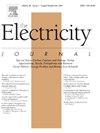Does electricity consumption impact biocapacity deficit? Evidence from domestic and commercial electricity consumption in India
IF 2.2
Q1 Social Sciences
引用次数: 0
Abstract
The increasing population across the world poses challenges for the fulfilment of electricity demand across various sectors, and subsequently impacts biocapacity. As India is the second-most populous country and the third largest electricity consumer globally, such challenges need to be addressed. While it is true that, in the context of electricity, pollution stems from the producer’s side, that from the consumer’s side is largely ignored. Using the Vector Error Correction model, this study investigates whether electricity consumption from the domestic and commercial sectors has an impact on biocapacity deficit. The result shows that, in the long run, domestic electricity consumption is not significant in causing biocapacity deficit, whereas commercial electricity consumption has an increasing effect on the latter, making it unsustainable. Further, lower levels of income and natural resource rents are also observed to lead to biocapacity deficit. In the short run, however, neither domestic nor commercial consumption has any significant impact on biocapacity deficit. The findings call for an extended focus on the sustainable management of electricity consumption across sectors so that their adverse impact on biocapacity can be minimised.
电力消费会影响生物容量赤字吗?来自印度家庭和商业用电的证据
全球人口的不断增长为满足各行各业的电力需求带来了挑战,并随之影响到生物容量。印度是全球第二大人口大国和第三大电力消费国,因此需要应对这些挑战。就电力而言,污染确实来自生产者,但来自消费者的污染却在很大程度上被忽视了。本研究利用向量误差修正模型,调查了家庭和商业部门的用电量是否会对生物容量赤字产生影响。结果表明,从长期来看,家庭用电对造成生物容量赤字的影响并不大,而商业用电对生物容量赤字的影响则越来越大,使其难以为继。此外,较低的收入水平和自然资源租金也会导致生物容量不足。然而,在短期内,无论是家庭消费还是商业消费都不会对生物容量赤字产生重大影响。研究结果呼吁扩大对各部门电力消费可持续管理的关注,从而将其对生物容量的不利影响降至最低。
本文章由计算机程序翻译,如有差异,请以英文原文为准。
求助全文
约1分钟内获得全文
求助全文
来源期刊

Electricity Journal
Business, Management and Accounting-Business and International Management
CiteScore
5.80
自引率
0.00%
发文量
95
审稿时长
31 days
期刊介绍:
The Electricity Journal is the leading journal in electric power policy. The journal deals primarily with fuel diversity and the energy mix needed for optimal energy market performance, and therefore covers the full spectrum of energy, from coal, nuclear, natural gas and oil, to renewable energy sources including hydro, solar, geothermal and wind power. Recently, the journal has been publishing in emerging areas including energy storage, microgrid strategies, dynamic pricing, cyber security, climate change, cap and trade, distributed generation, net metering, transmission and generation market dynamics. The Electricity Journal aims to bring together the most thoughtful and influential thinkers globally from across industry, practitioners, government, policymakers and academia. The Editorial Advisory Board is comprised of electric industry thought leaders who have served as regulators, consultants, litigators, and market advocates. Their collective experience helps ensure that the most relevant and thought-provoking issues are presented to our readers, and helps navigate the emerging shape and design of the electricity/energy industry.
 求助内容:
求助内容: 应助结果提醒方式:
应助结果提醒方式:


